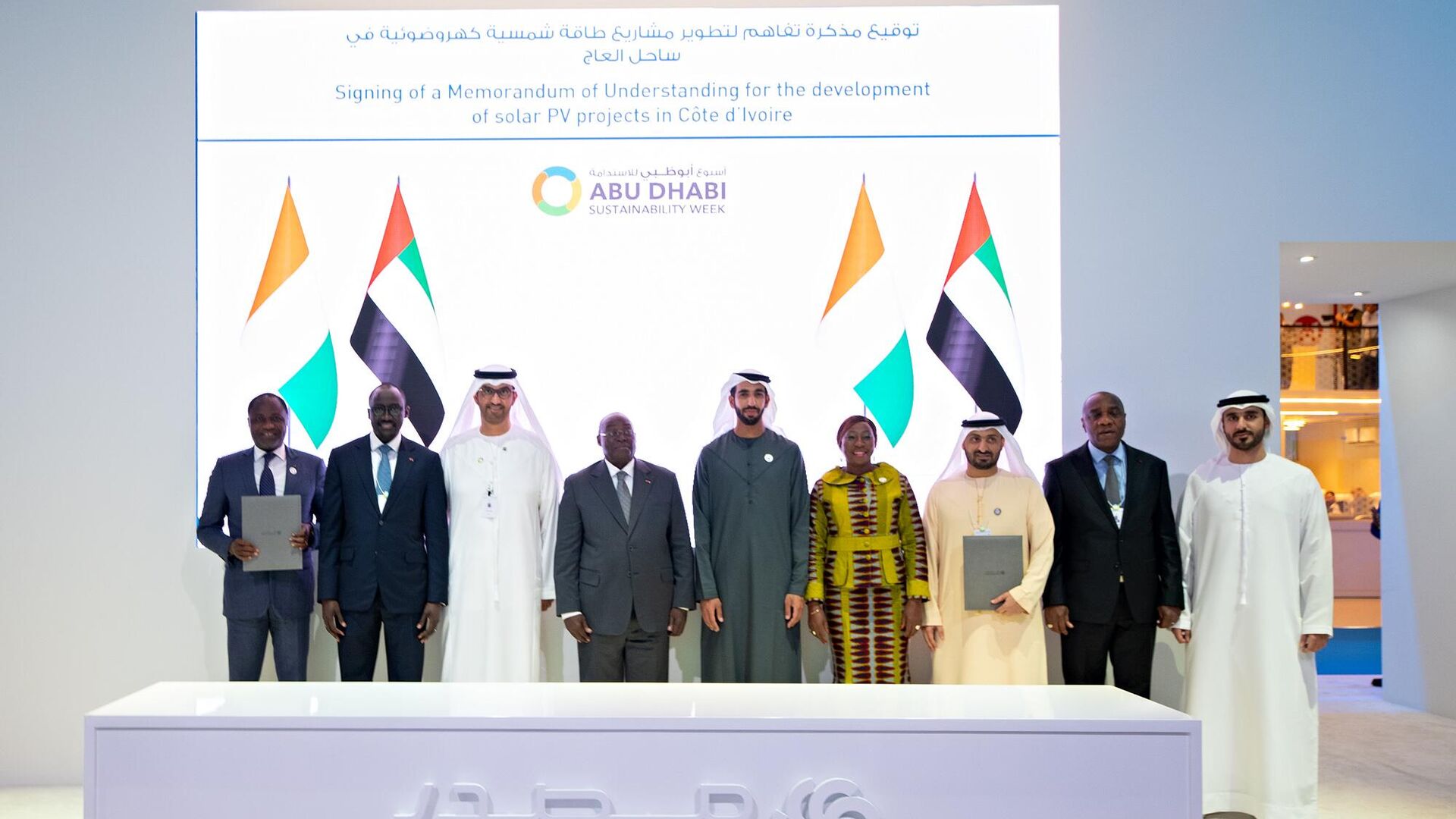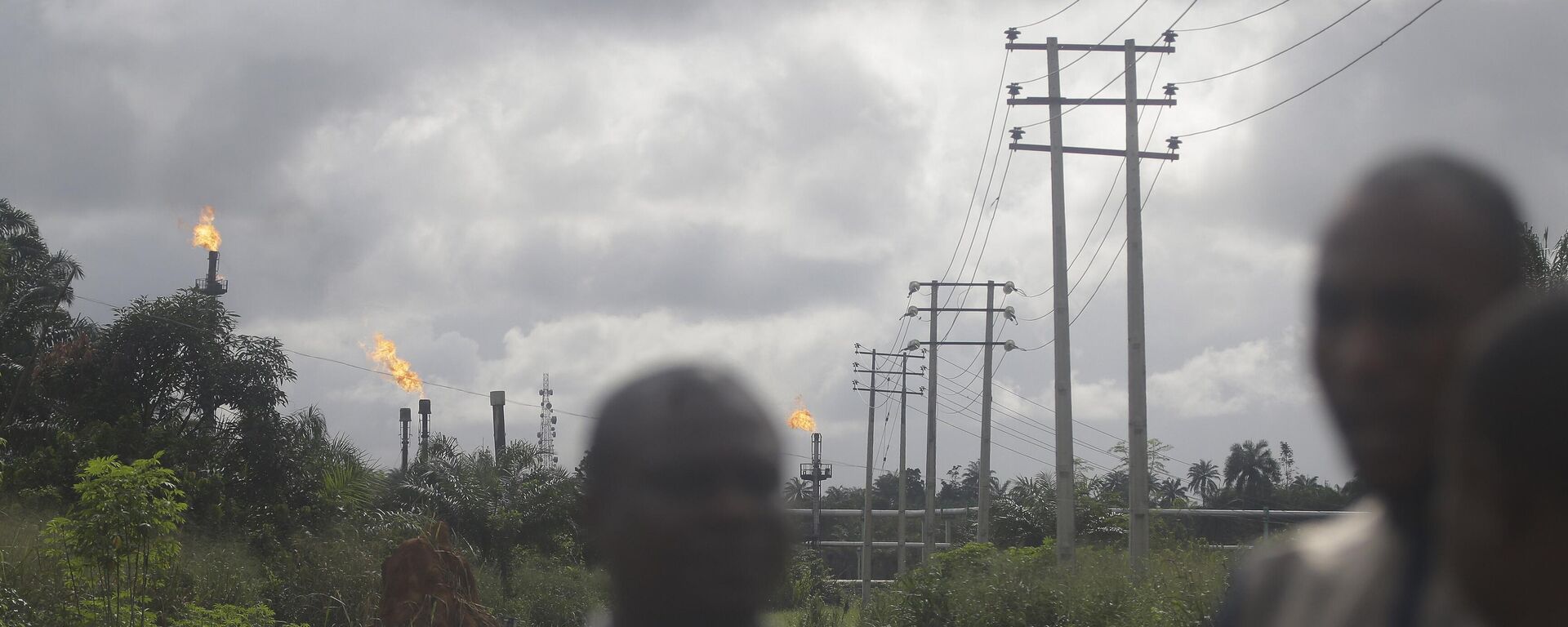https://sputnikglobe.com/20230311/ivory-coast-signs-agreement-with-uaes-masdar-to-develop-solar-power-plant-1108288576.html
Ivory Coast Signs Agreement With UAE's Masdar to Develop Solar Power Plant
Ivory Coast Signs Agreement With UAE's Masdar to Develop Solar Power Plant
Sputnik International
The Ivory Coast has signed a deal with Masdar, one of the world’s leading clean energy companies, to explore the development of a solar power plant with a capacity of 50-70 megawatts (MW).
2023-03-11T11:20+0000
2023-03-11T11:20+0000
2023-03-11T11:21+0000
africa
west africa
cote d'ivoire
solar energy
solar power plant
solar power
renewable energy
uae
energy crisis
https://cdn1.img.sputnikglobe.com/img/07e7/03/0b/1108288700_0:349:2001:1474_1920x0_80_0_0_75db110a1372f127d7e68436df78bb07.jpg
The Ivory Coast has signed a deal with Masdar, one of the world’s leading clean energy companies, to explore the development of a solar power plant with a capacity of 50-70 megawatts (MW). The company, based in Abu Dhabi in the United Arab Emirates, stated that the agreement will support the Ivory Coast's efforts to achieve its clean energy goals and boost sustainable economic development. It was signed by Mamadou Sangafowa Coulibaly, the Ivorian minister of mining, petroleum, and energy, and Fawaz Al Muharrami, executive director of clean energy, Masdar, in the presence of other high-profile officials. During the signing ceremony, the minister reiterated the country's commitments to reduce greenhouse gas emissions by 32%, as well as increase the share of renewable energy to more than 40% by 2030. He noted that in accordance with these goals, the government has created a master plan for the development of the country's production facilities in the renewable energy sector, including solar, hydroelectricity, and biomass. Therefore, the agreement is part of this plan.According to Masdar, the company sees "enormous potential" for the renewable-energy industry in Africa, given the continent's projected large-scale development and growth, as well as low clean energy penetration levels. In general, it has as a goal to deliver 100 gigawatts (GW) of renewable energy all over the world by 2030. It was also stated that the agreement is signed under the Etihad 7 initiative, a program launched by the UAE last year to fund renewable energy projects in Africa, with the objective of achieving 20 GW capacity to provide 100 million people across the continent with clean electricity by 2035.With the Ivory Coast signing, the company underlined, there are now five projects set to be developed under the initiative. Three of them were signed during the Abu Dhabi Sustainability Week 2023 held on January 16-19, including agreements with Angola, Uganda, and Zambia. In August, Masdar also signed a deal with Tanzania's sole provider of electricity, TANESCO, to develop clean energy projects with a total capacity of up to 2 GW. According to the International Energy Agency (IEA), despite recent efforts to enhance power generation in Africa, it remains the least electrified continent in the world, with over half of the population lacking access to electricity. The agency’s latest projections indicate that 565 million people in Sub-Saharan Africa will still be without access to electricity in 2030. At the same time, the continent has vast resource potential in wind, solar, hydro, and geothermal energy that African countries are willing to develop. Meanwhile, the European Union sees Africa as one of the the most important partners in terms of developing the renewable energy sector, according to the EU's climate chief, Frans Timmermans.
https://sputnikglobe.com/20230308/africa-must-meet-local-demand-before-contributing-to-europes-energy-needs--oil-firm-ceo-1108169504.html
africa
west africa
cote d'ivoire
uae
Sputnik International
feedback@sputniknews.com
+74956456601
MIA „Rossiya Segodnya“
2023
News
en_EN
Sputnik International
feedback@sputniknews.com
+74956456601
MIA „Rossiya Segodnya“
Sputnik International
feedback@sputniknews.com
+74956456601
MIA „Rossiya Segodnya“
ivory coast, uae, west africa, energy crisis, energy supply, renewable energy, electricity, agreement, solar energy, solar power plant
ivory coast, uae, west africa, energy crisis, energy supply, renewable energy, electricity, agreement, solar energy, solar power plant
Ivory Coast Signs Agreement With UAE's Masdar to Develop Solar Power Plant
11:20 GMT 11.03.2023 (Updated: 11:21 GMT 11.03.2023) Along with other states across the globe, the West African nation is looking to switch to renewable energy sources in order to reduce greenhouse gas emissions and lower dependence on fossil fuels. The Ivory Coast is committed to increasing the share of renewables in its power mix to 45% by 2030.
The Ivory Coast has signed a deal with Masdar, one of the world’s leading clean energy companies, to explore the development of a solar power plant with a capacity of 50-70 megawatts (MW).
The company, based in Abu Dhabi in the United Arab Emirates, stated that the agreement will support the Ivory Coast's efforts to achieve its clean energy goals and boost sustainable economic development. It was signed by Mamadou Sangafowa Coulibaly, the Ivorian minister of mining, petroleum, and energy, and Fawaz Al Muharrami, executive director of clean energy, Masdar, in the presence of other high-profile officials.
"Masdar and the Ivorian Ministry of Mining, Petroleum and Energy will explore the joint development of solar photovoltaic plants in Côte d'Ivoire, starting with a first 50-70-megawatt (MW) plant," the company's statement read.
During the signing ceremony, the minister reiterated the country's commitments to reduce greenhouse gas emissions by 32%, as well as increase the share of renewable energy to more than 40% by 2030. He noted that in accordance with these goals, the government has created a master plan for the development of the country's production facilities in the renewable energy sector, including solar, hydroelectricity, and biomass. Therefore, the agreement is part of this plan.
"The framework agreement that we have just signed with Masdar, accompanied by a first project of 50 to 70 MW, will contribute, in addition to the other initiatives that the Ivorian government is undertaking, to achieving this ambitious objective," Coulibaly said.
According to Masdar, the company sees "enormous potential" for the renewable-energy industry in Africa, given the continent's projected large-scale development and growth, as well as low clean energy penetration levels. In general, it has as a goal to deliver 100 gigawatts (GW) of renewable energy all over the world by 2030.
It was also stated that the agreement is signed under the Etihad 7 initiative, a program launched by the UAE last year to fund renewable energy projects in Africa, with the objective of achieving 20 GW capacity to provide 100 million people across the continent with clean electricity by 2035.
With the Ivory Coast signing, the company underlined, there are now five projects set to be developed under the initiative. Three of them were signed during the Abu Dhabi Sustainability Week 2023 held on January 16-19, including agreements with Angola, Uganda, and Zambia. In August, Masdar also signed a deal with Tanzania's sole provider of electricity, TANESCO, to develop clean energy projects with a total capacity of up to 2 GW.
According to the International Energy Agency (IEA), despite recent efforts to enhance power generation in Africa, it remains the least electrified continent in the world, with over half of the population lacking access to electricity. The agency’s latest projections indicate that 565 million people in Sub-Saharan Africa will still be without access to electricity in 2030.
At the same time, the continent has vast resource potential in wind, solar, hydro, and geothermal energy that African countries are willing to develop. Meanwhile, the European Union sees Africa as one of the the most important partners in terms of
developing the renewable energy sector,
according to the EU's climate chief, Frans Timmermans.



